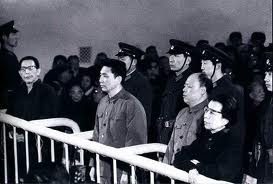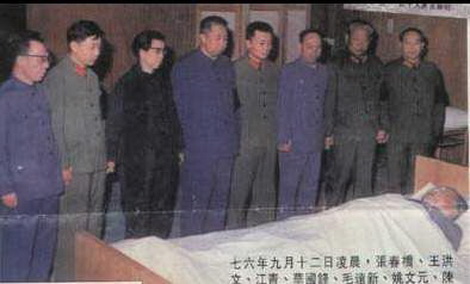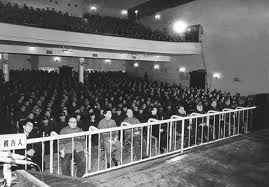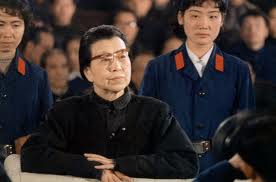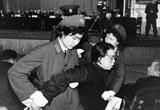|
The Gang of Four Trial by Haiping Zheng (2010) For additional information about the trial and a
Chinese language version of this account, see: http://zhenghaiping.fyfz.cn/
The
Gang of Four (GoF) was the name given to a leftist political group
composed of four Chinese Communist Party (CCP) members. They wielded
significant power during China’s Cultural Revolution (1966-76) and were
subsequently charged of various crimes. Their trial in late 1980
represented a significant change in China’s history since the founding
of P.R.C. in 1949.
The Gang of Four at trial. From left to right: Zhang Chunqiao,Wang Hongwen, Yao Wenyuan, Jiangqing. (1980/11/20)
I. Background In 1966, Mao
Zendong, the Chairman of the CCP, launched the Cultural Revolution, the
proclaimed aim of which was to “root out and
right-wing capitalist who infiltrated the party.”
In the following ten years or so, millions of “Red Guards” (mostly
young people) across the country were mobilized to destroy the
“right-wing capitalists” --- mostly the intelligentsia and bureaucrats.
While Mao was worshiped like a “living God,” almost all the high-level
officials who disagreed with Mao were persecuted. During
the Cultural Revolution, the GoF, representing the leftist political
faction within the CCP, essentially became the central mobilizing force
at the National level. The leading figure of the GoF was Jiangqing,
Mao’s third and last wife, who became a member of the Politburo in 1969. Her three other associates were all high-level
officials by
1976 ---- Zhang Chuanqiao was a vice-Primer Minister of the State
Council, Wang Hongwen was vice-chairman of CCP, Yao Wenyuan was a
Sectary of CCP in Shanghai. They also held many other positions in the
Party, government and even military. Immediately after Mao’s Death on December 9, 1976, a power struggle occurred between the “leftists” GoF and the “rightists”--- an alliance led by Deng Xiaoping and Marshall Ye Jianying. At that time, the nominal “head” of the country was Hua Guofeng, who was Mao’s designated successor. Although Hua was clearly faithful to Mao, it was unclear whether he would support the “leftist” or the “rightist.” Indeed, Mao chose Hua as his successor largely because Hua was a compromise candidate between the “leftists” and “rightists.” Upon Mao’s death, both sides attempted to convince or even coerce Hua to surrender power to them. The GoF were particularly aggressive. With effective control over the State’s media, the GoF continued to denounce Deng and his “rightist” ally.
The top leaders of China standing before Mao's remains after Mao's death on Sep. 9, 1976. From left to right: Zhang Chunqiao, Wang Hongwen, Jiang Qing, Hua Guofeng, Mao Yuanxin, Yao Wenyuan, Chen Xillian, Wang Dongxing. (1976/9/12)
After almost
three weeks’ struggle, Hua finally leaned toward the “rightist” side.
He consented
to Marshall Ye’s suggestion to arrest the GoF. However, they knew it
was not an easy task. The GoF had certain control in military. Being
aware the risk, Hua and Ye secretly worked out a detailed “kidnap”
plan. II. Arrest In
the evening of October 6, 1976, each member of the GoF was informed to
attend an emergency session of the Politburo. The session was to take
place in the Great Hall of the People in Beijing. As several important
issues were to be discussed, all Politburo members were required to
attend the session. Some
time between 7:55 PM and 8:30 PM on that day, the members of GoF came
to the Great Hall of People. One by one, they were apprehended by
military personnel as soon as they passed through the doors into the
entrance lobby. All was done in superb efficiency. Without any gunfire,
the members of GoF and some of their associates were captured. They did
not even have a chance to cry for “help.” In the same
night, the GoF and their associates were transported to Qincheng
prison, a maximum-security
prison located in northwestern Beijing. Also in that night, the Hua
group met with other Politburo members informed them that the
GoF had
been arrested. Soon,
the public denunciations of the GoF began. In many cities around the
country, a lot of people gathered to celebrate the arrest of GoF. The
trial, however, would not begin until four years later. III. Between Arrest and
Trial Between
the arrest of the GoF in October 1976 and their formal trial in
November 1980, China’s political landscape underwent significant
changes. While the “rightists” gradually consolidated their power, the
GoF’s influence was quickly diminishing. In July 1977,
the “rightist” leader Deng Xiaoping came to power. A year later, the Third
Plenum of the Eleventh National Party Congress Central Committee
(NPCCC) became a turning point in modern Chinese history. In the
Plenum, the Party officially ended the Culture Revolution and its
class-struggle ideology, proclaiming “Four Modernization” as its goal. In
September 1979, in the Fourth Plenum of the Eleventh NPCCC, Marshal Ye
Jianying declared that the Cultural Revolution “an appalling
catastrophe” and “the most severe setback to the socialist cause since
1949.” During the same Plenum, Deng
proposed to hold an open trial of the GoF so as to show the CCP’s
determination to “correct” the mistakes of Cultural Revolution and to
educate the public. A special panel was formed to direct the trial. In February
1980, Deng called on the convention of the Fifth Plenum
of the Eleventh NPCCC. The Committee elevated Deng's proteges Hu
Yaobang and Zhao Ziyang to the Standing Committee of the Political
Bureau. In addition, the Committee declared the innocence of Liu
Shaoqi, one top CCP leader who was allegedly persecuted to death by the
GoF during the Cultural Revolution. At
the Fifth National People's Congress session in August and September
1980, Deng's protege Zhao Ziyang became the Primer Minister. Also, the
Congress authorized the establishment of a “Special Prosecutor Team” as
well as two “Special Courts” to try the GoF and their associates. The
trial was to begin in November 1980. IV. Trial The trial formally began on November 20,
1980. More than 880 “representatives of the masses” from all parts of
the country attended the “open trial.” Among them were some family
members of senior officials who were prosecuted during the Cultural
Revolution. Also, there were more than 300 journalists
from various parts of the country. All the ten defendants, including GoF and their six associates, were brought to court on the first day of the trial. Also, ten defense attorneys appeared with their clients. (Several days before the trial, the defendants were asked whether they want a defense attorney to represent them. Five of the ten defendants said “yes” while the other five said “no.” Each defendant who wanted the assistance of council was assigned two attorneys.)
The courtroom on the first day of trial. Ten defendants were sitting in the front row. (1980/11/20) At
about 3:20 PM, the prosecution began the “opening statement.” They had
prepared a 20,000-word indictment, portions of which had been printed
in China’s major newspapers the day before the trial. The indictment
charged the GoF and their associates of various crimes that
took place during the Cultural Revolution, including
treasure, persecution of others, attempts to seize power, training a large
militia to oppose the regular army, and other
“Anti-Revolution crimes.” Particularly, it
specified that during the Cultural Revolution, the GoF “persecuted”
750,000 people, 34,375 of whom died, though it is dubious how these ten
individuals could persecute so many people. Because
the indictment was too long for a prosecutor to read, two prosecutors
alternated in reading the indictment. Although the defense attorneys
were present in the courtroom, they did not have a chance to make their
“opening statement” that day. In the following forty
days or so, the GoF were to be tried by the No. 1 “Special Court,”
while their associates would be tried by the No. 2 “Special Court.” It
is impossible to provide a detailed account of the trial here. The
following part outlines some of the major issues raised during the
trial of GoF in the No. 1 “Special Court.”
A. The Plot to Seize Power (of CCP) In
the morning of November 24, the prosecution announced the charge
against the GoF that they attempted to seize power in 1974. According
to the prosecutor, when the former Primer Minister Zhou En’lai fell ill
in 1972, he convinced Chairman Mao to bring back the then “exiled” Deng
Xiaoping to serve as the First Vice-Primer Minister. Because the GoF
“purged” and exiled Deng during Cultural Revolution, they worried about
Deng’s retaliation. Therefore, they conspired to prevent Deng from
re-gaining power. The
first witness took stand was Wang Hongwen, who testified that he
secretly went to see Mao on October 18, 1974. The purpose was to intimated
Mao that Deng and Prime Minister Zhou were conspiring against Mao’s
leadership, so as to undermine Deng’s “rehabilitation.” He further
testified that he was acting under the instructions of Jiang and Zhang.
In the afternoon of the same day, Yao Wenyuan
also admitted that he participated in the
plot. However, he attempted to defend himself by reading a “defense
statement” he himself drafted before the trial. Also, Yao’s lawyers
argued that Yao only played an “accessory” role during the plot
and therefore should be treated leniently.[i] On November 26, Jiang testified
for the first time. When the judge asked her about the plot, she
replied with “I can not remember.” Then, the prosecutor called on Wang
and two other individuals to testify about the plot. Upon hearing the
testimony, Jiang still denied any participation in the plot. She
requested to “cross-examine” Wang. But the judge dismissed her request.
Jiang began to shout, “This trial is nothing more than a parody of
justice!” At that point, the judge ordered the court
personnel to escort Jiang out of the courtroom. B. Persecution of Liu Shaoqi The trial
revealed many details of GoF’s persecution of senior officials during
the Cultural Revolution. Particularly,
the persecution of Liu Shaoqi gained special attention during the
trial. Liu had been
one of the top leaders of CCP during China’s revolutionary years since
1920s. In 1959, he was elected to be the
Chairman of PRC, succeeding Mao, who served as the Chairman between
1954 and 1959. He was then re-elected to be the Chairman in 1965.
However, at the beginning of the Cultural Revolution, Liu quickly
became
the subject of Red Guards’ attack. In December 1966, the Red Guards
began to publicly denounce Liu as a “traitor.” Within three years, Liu
was persecuted to death. Liu’s wife was “arrested” by Red Guards in
January 1967 and then imprisoned for almost twelve years before being
released in 1979. She was attending the trial as an observer.[ii] 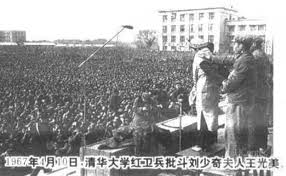 Wang Guangmei, Liu Shaoqi's wife, was being publicly denounced at Tsinghua University. (1967/4/1)
On November
27, 1980, Zhang Chunqiao was brought to the court. After
the prosecutors announced the changes that Zhang played a key role in
persecuting several of former Chinese leaders, the judge demanded Zhang
to respond. However, Zhang refused to speak. The chief judge warned
Zhang that he could be convicted despite his silence. Zhang
disregarded the warning as if he heard nothing. Later, reporters would
describe Zhang as “the most obstinate member of the GoF” because he
barely said anything throughout the forty-day trial. As Zhang had
rejected government’s offer to provide attorney assistance, none spoke
on his behalf throughout the trial. Then
the prosecutor called on its witness Kuai Dafu, who was a student at
Stinghua University in 1966 and later became a prominent leader of “Red
Guards” in Beijing. Kuai testified that on December 18, 1966, Zhang
privately met him and instigated him to mobilize Red Guards to
“overthrow” Liu Shaoqi and Deng Xiaoping, the deputy Prime Minister at
that time. Under the instructions of Zhang, Kuai summoned more than
5,000 students on December 25, and began to publicly denounce Liu and
Deng. The news shocked many Chinese at that time. After all, both Liu
and Deng were top leaders of PRC. On
December 3 and December 5, the prosecutors introduced further evidence
that the GoF, particularly Jiang and Zhang, played a key role in
persecuting Liu and other senior officials. Several witnesses testified
that they were tortured to “expose” Liu and his wife’s “crimes." Also,
the prosecutor introduced evidence that several individuals were
tortured to death because they refused to falsely testify against Liu.
Finally, another individual testified that Kang Sheng, one of Jiang’s
close associates in the early years of Cultural Revolution, wrote the
report about Liu’s crime based on mostly fabricated evidence or
allegations without evidence. Jiang then relied on the report to
“convict” Liu. The persecution eventually resulted in Liu’s death in
November 12,1969. Faced with the evidence, Jiang did not deny her participation in the persecution of Liu. However, she argued that she was only an “assistant” in persecuting Liu, implicating that she was merely following the orders of Mao. Moreover, she asked: “most members of the CCP Central Committee at that time denounced Liu. If I am guilty, why not hold them guilty as well?” This remark irritated the Chief Judge. He ordered Jiang to “shut up!” In response, Jiang shouted “Revolution is glorious! Revolution is no crime!” This is a familiar slogan during Culture Revolution. The judge ordered the court personnel to escort Jiang out of the courthouse. At that point, Jiang seemed to be crazy, reportedly shouted “I was Chairman Mao's dog. I bit whomever he asked me to bit!" Again, she implicated Mao into the persecution of Liu and other senior officials.
Jiang Qing at trial. On the left, she was listening to the indictment. On the right, Jiang was being escorted out of the courthouse. She was still shouting "Revolution is glorious!" (1980/11)
C. Jiang’s Persecution of Artists Before
marrying Mao in 1938, Jiang had been an actress in Shanghai. In early
1930s, Jiang fell in love with Tang Na. Many artist friends witnessed
their love affairs. After marrying Mao, Jiang attempted to cover up her
earlier “scandals.” Particularly during the Cultural Revolution, she
threw many of her early artist friends to prison so that they would not
disclose her “private matters” to the public. Several
witnesses were called on to testify about Jiang’s persecution of some
of her artist friends. For example, Jiang Tengjiao testified that in
October 1966 he lead 40 people to carry out raids on the homes of
several well-know actors and writers. They were acting under the order
of Jiang Qing. The purpose of the raids was to search for “love
letters,” photos and other potentially damaging materials related to
Jiang Qing's early career in Shanghai. Later, they arrested the actors
and threw them in jail. Another
witness was Huang Chen, the wife of a famous artist. She described how
their home was searched and their property confiscated or destroyed by
“Red Guarders” dispatched by Jiang, and how her husband was secretly
arrested and then tortured to death. Huang shed tears while
recapitulating the story. Jiang attempted to converse with Huang by
saying “A’Huang, I do not know about this.” Huang was in such a rage
that she shouted “shut up! You are such an evil person that you have no
right to talk with me at all!” D. Summary
of the Trial As
the trial went on, Jiang became increasingly defiant. On December 24,
after the Chief Judge summarized the charges against Jiang, Jiang
suddenly stand up and loudly accused the Chief Judge as a “fascist.”
She claimed that “the real purpose of the trial is to vilify Chairman
Mao and the great Cultural Revolution initiated by Mao.” Obviously she was
“defending” herself by cloaking herself in Mao's mantle. When
the Judge reminded her to “rationally” defend herself, Jiang became
even angry. “This trial is only a show trial. I do not bother to defend
myself.” Jiang then announced that it would be “more glorious to have my head chopped off” and
dared the court to execute her. On
December 29, 1980, after the testimony of forty-nine witnesses and the
showing of more than 870 pieces of evidence, the trial finally came to
the end. Summing
up the case, the Chief prosecutor acknowledged Chairman Mao’s “great
contribution” to China, but also noted that Mao was responsible for the
“plight” of people during the Cultural Revolution. He argued that the
GoF (particularly Jiang) can not escape punishment by raising Chairman
Mao as a “shield.” He then cited some remarks of Mao in 1974 and 1975,
trying to demonstrate that Mao disagreed with the GoF on many issues.
He then demanded death sentence for Jiang. Upon hearing this, Jiang immediately began to
shout “Revolution is glorious! Revolution is no
crime!” Again, she was dragged out of the courthouse. On
January 25, 1981, the sentences were handled down. Jiang and Zhang were
sentenced to death with a two-year reprieve. Wang was sentenced to life
imprisonment. Yao received a 20-year imprisonment sentence. There was
no appeal process. IV. Aftermath On
January 25, 1983, Both Jiang and Zhang death penalty sentence were
commuted to life imprisonment. It was reported that Jiang showed no
repentance on receiving the reduced sentence. Instead, she shouted
“kill me! Why you do not kill me?” More than nine years later, on May
14, 1992, Jiang committed suicide in a hospital, after being released
on medical grounds. All
other three members of the GoF have died. Wang Hongwen passed
away in 1992. Yao Wenyuan was released on October 5, 1996, after
finishing his twenty-year imprisonment. He then passed away in December
2006. Zhang Chunqiao passed away in 2005.
Many
westerners criticized the trial as a “show trial.” Indeed, the GoF
were declared to be “guilty” in major Chinese newspapers moths
before
the trial. Also, some participating judges later revealed that the
sentence to Jiang and Zhang ---- death penalty with a two-year reprieve
--- were determined by the Politburo of CCP
Central Committee before the trial. The real question was the
“appropriate” sentences for other members of the GoF and their
associates. Nevertheless, the trial was significant in
China for several reasons. First, it discredited
the GoF and other leftist radicals who initiated the Cultural
Revolution. Second, it lowered public esteem for Mao without entirely
discrediting him. Third, it afforded the defendants an “open trial.” In
spite of its numerous defects, the trial represented a progress
compared with the situation in Culture Revolution, when individuals can
be arrested, jailed and tortured without any formal trial.
[i]
Among the four members of the GoF, Yao Wenyuan was probably the one who
made best efforts to defend himself. While all other three dismissed
the government’s offer of assistance of lawyer, Yao did “accept” the
offer. |
